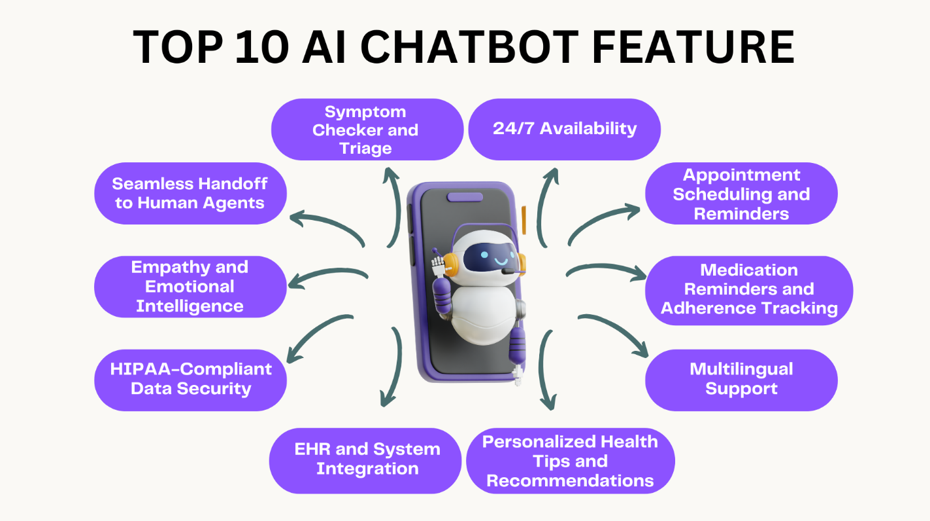The healthcare industry is experiencing a revolution with the integration of Artificial Intelligence (AI) into Electronic Health Records (EHR) systems. EHRs have long served as digital repositories for patient data, Chatbot for Medical Staff but the introduction of AI is making these systems smarter, faster, and more effective. By automating routine tasks, enhancing decision-making, and streamlining workflows, AI is transforming how healthcare professionals interact with patient data, leading to improved care delivery and better clinical outcomes.
1. The Evolution of EHR Systems
EHR systems were designed to digitize patient records and streamline healthcare workflows. However, they often come with challenges such as data overload, inefficient interfaces, and administrative burdens on healthcare providers. AI is addressing these limitations by:
- Enhancing data organization and
- Reducing manual entry errors.
- Streamlining complex documentation processes.
2. How AI Enhances EHR Systems
2.1 Improved Data Accuracy
AI algorithms help ensure that the data inputted into EHR systems is accurate and up-to-date. By analyzing large datasets in real-time, AI
flags potential errors and inconsistencies, ensuring that the information healthcare providers use for decision-making is reliable.
2.2 Predictive Analytics and Decision Support
AI-powered EHR systems provide predictive analytics that assist clinicians in making better, more informed decisions. For instance, AI can analyze historical patient data to predict the likelihood of future health conditions, enabling early interventions Chatbot for Medical Staff.
2.3 Natural Language Processing (NLP) for Documentation
AI’s Natural Language Processing (NLP) capabilities enable automatic transcription of clinical notes and patient interactions, allowing doctors to focus on patient care rather than administrative tasks. This results in a more efficient documentation process and better structured data.
3. Benefits of AI-Enhanced EHR Systems
3.1 Streamlined Workflows
By automating routine tasks like appointment scheduling, prescription refills, and data entry, AI reduces the administrative load on healthcare staff, allowing them to focus more on patient care.
3.2 Personalized Patient Care
AI-driven insights allow for the personalization of treatments by analyzing patient-specific data, genetics, and medical history. This helps in developing tailored treatment plans that are more effective and result in better outcomes.
3.3 Faster Access to Critical Information
AI accelerates the retrieval of relevant patient information from EHR systems, providing healthcare providers with the right data at the right time. This is particularly crucial in emergency situations where quick decision-making is vital Chatbot for Medical Staff.
3.4 Enhanced Patient Engagement
AI enables patients to interact with EHR systems through chatbots, virtual assistants, and personalized portals. This improves communication between patients and healthcare providers, fostering greater patient involvement in their care.
4. AI-Driven Innovations in EHR Systems
4.1 AI-Powered Clinical Decision Support
EHR systems, when integrated with AI, can provide clinical decision support by analyzing real-time patient data and suggesting evidence- based recommendations. This helps physicians make more accurate diagnoses and treatment decisions Chatbot for Medical Staff.
4.2 Predictive Health Monitoring
AI analyzes patterns in patient data stored within EHRs to predict potential health complications. For example, AI can detect early signs of sepsis or heart disease, enabling healthcare providers to act before a condition worsens.
4.3 Seamless Interoperability
AI improves the interoperability of EHR systems, enabling seamless data exchange between different healthcare providers and systems. This ensures that patient records are easily accessible across various care settings, leading to more coordinated care.
5. Challenges of AI Integration in EHR Systems
5.1 Data Privacy and Security
With AI systems handling large amounts of sensitive patient data, concerns about data privacy and cybersecurity are paramount. Healthcare organizations must ensure compliance with HIPAA and other regulations while safeguarding against potential breaches.
5.2 High Implementation Costs
AI-enhanced EHR systems can be costly to implement and maintain, especially for smaller healthcare facilities. The initial investment and training required to adopt these systems can be a barrier to widespread adoption Chatbot for Medical Staff.
5.3 Learning Curve and Adoption
Healthcare providers may face challenges in adapting to new AI-driven EHR systems, which often require training and familiarity with new technologies. Ensuring proper training is essential for smooth implementation.
6. Key Takeaways
- AI-driven EHRs are revolutionizing healthcare by enhancing patient management, providing personalized care, and enabling predictive insights that improve outcomes.
- Integrating AI into EHR systems unlocks new possibilities in the healthcare It will bring out the best potential from the health professionals and give the best treatments to the patients as well.
- However, there are some challenges that also come with data solutions. Suppose, you carry an AI-driven EHR system into your healthcare app development. It will create a better digital environment because it is based on the cloud computing.
7. The Future of AI in EHR Systems
The future of healthcare lies in the continued integration of AI with EHR systems. As AI technology advances, we can expect:
- More accurate predictive models for patient
- Fully integrated remote patient monitoring.
- Greater automation in healthcare
- Improved patient outcomes through precision
AI-driven EHRs will play a pivotal role in shaping the future of healthcare by making systems more efficient, reducing administrative burdens, and ensuring that patients receive the best care possible.
8. How does AI improve EHR?
8.1 Automating Data Entry
AI can automate routine and manual data entry tasks, reducing the administrative burden on healthcare providers. Technologies like Natural Language Processing (NLP) and voice recognition convert spoken notes or written text into structured EHR data. This improves documentation accuracy and saves time for healthcare providers.
8.2 Improving Data Accuracy and Quality
AI helps identify and correct data entry errors or inconsistencies in real- time. By analyzing large datasets and comparing new entries with existing records, AI ensures that the data stored in EHRs is consistent, reliable, and up-to-date. This leads to better clinical decisions based on accurate information.
8.3 Personalized Patient Care
AI can analyze individual patient records, genetic data, and historical information to offer personalized treatment plans. This allows for customized healthcare, where treatments are tailored to the specific needs of each patient, leading to better outcomes and improved patient satisfaction.
8.4 Real-Time Insights and Alerts
AI in EHRs provides real-time alerts for clinicians about critical patient data. For example, AI can alert healthcare providers if a patient’s vitals reach dangerous levels or if there are potential adverse drug interactions, enabling timely intervention Chatbot for Medical Staff.
8.5 Population Health Management
AI can aggregate and analyze data across large patient populations to identify health trends and risk factors. This helps in managing public health initiatives, identifying at-risk groups, and optimizing healthcare resources.
8.6 Natural Language Processing for Better Documentation
AI’s NLP capabilities allow healthcare providers to dictate notes or automatically transcribe doctor-patient interactions into EHR systems. This streamlines documentation processes, ensures more detailed clinical notes, and improves data organization.
How Much Does a Custom AI EHR Cost?
Key cost factors
- The intended scope and complexity of AI
- The required accuracy of ML
- The data quality thresholds, number of data sources, and the volume of data to be stored and processed.
- The number and complexity of integrations with other solutions (e.g., patient portals).
- Security, UI, and UX
- Compliance-associated costs (e.g., for FDA registration of SaMD functionality).
- Cloud services (e.g., ML tools), infrastructure, maintenance, and support costs.
Conclusion
AI is revolutionizing EHR systems by making them smarter, faster, and more effective. With improved data accuracy, predictive analytics, and streamlined workflows, healthcare providers can deliver better, more personalized care to patients. While challenges such as privacy concerns and high costs remain, the potential benefits of AI-enhanced EHR systems far outweigh the obstacles, paving the way for a future of smarter healthcare.









